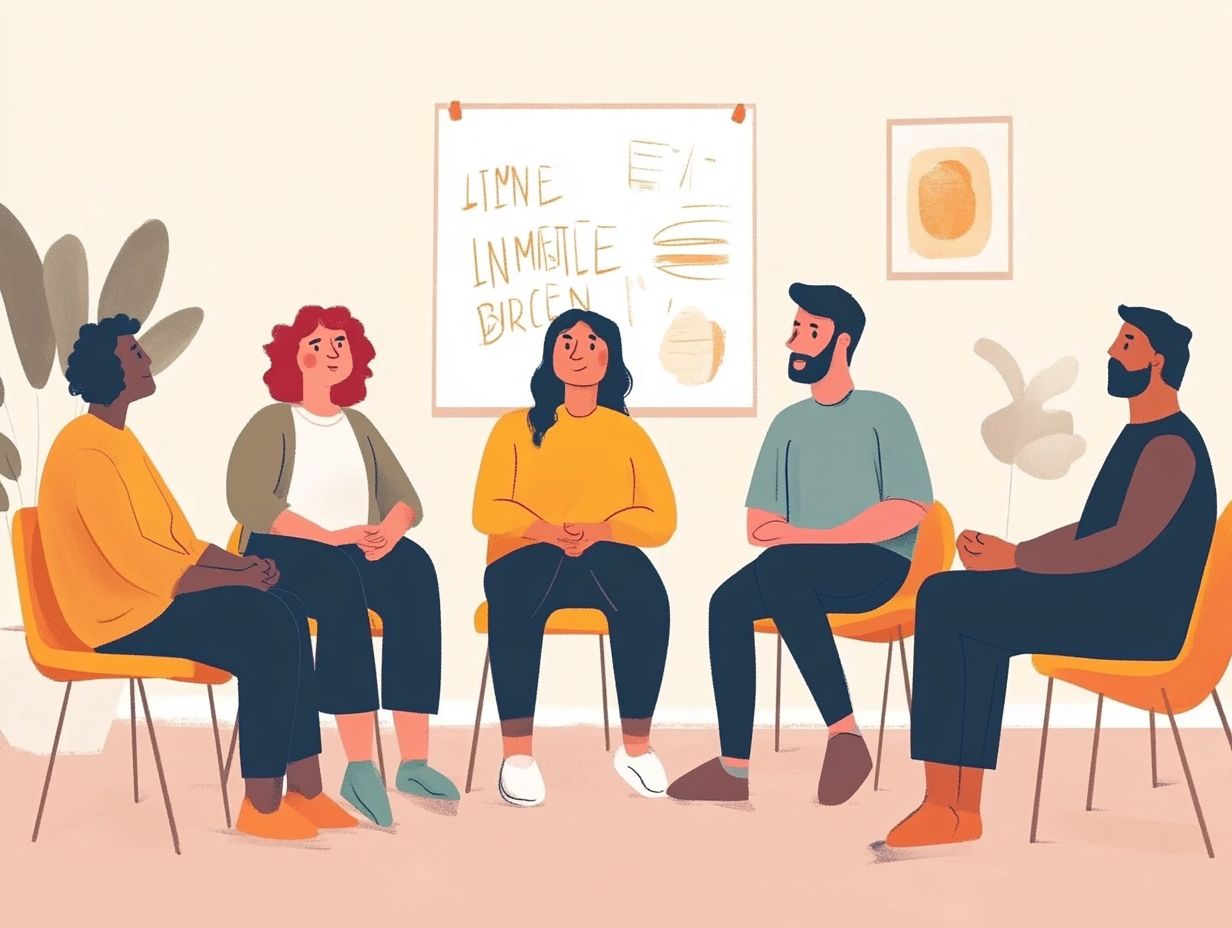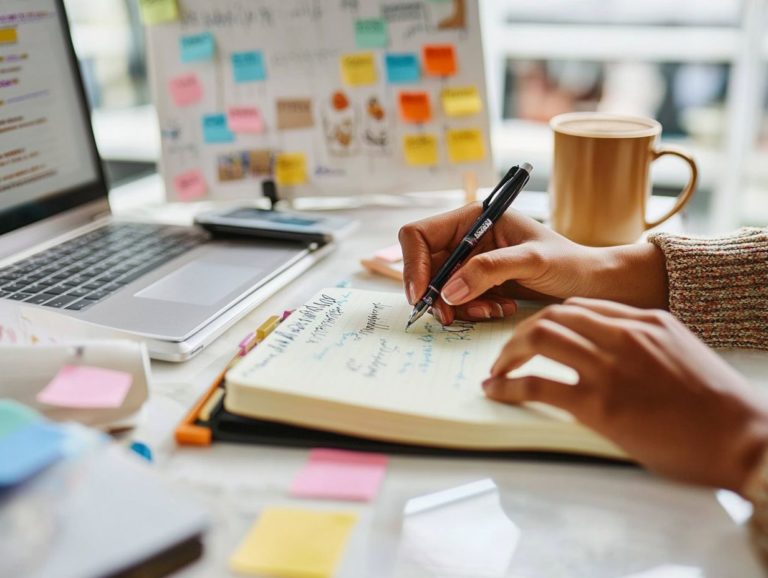5 Effective Workshops for Limiting Beliefs
Beliefs shape how you perceive yourself and the world around you, but some of those beliefs may be holding you back. Discover how to identify and challenge your limiting beliefs!
This article delves into practical strategies to reframe your thoughts and cultivate a more positive mindset.
From engaging in self-talk to harnessing the power of visualization, workshops can equip you with deeper insights and tools for meaningful change. Take the first step now to free yourself from limiting beliefs and unlock your true potential!
Contents
- Key Takeaways:
- 1. Identifying Your Limiting Beliefs
- 2. Challenging Your Limiting Beliefs
- 3. Reframing Your Thoughts and Beliefs
- 4. Practicing Positive Self-Talk
- 5. Visualization and Affirmations
- How Do Limiting Beliefs Affect Our Lives?
- Frequently Asked Questions
- 1. What are limiting beliefs and how can they hold us back?
- 2. How can attending a workshop help with limiting beliefs?
- 3. What are the benefits of participating in 5 Effective Workshops for Limiting Beliefs?
- 4. Who can benefit from attending these workshops?
- 5. What can I expect from these workshops?
- 6. How can I sign up for 5 Effective Workshops for Limiting Beliefs?
Key Takeaways:

- Identify and acknowledge your limiting beliefs to better understand their impact on your life.
- Challenge and question your limiting beliefs with evidence and alternative perspectives to break free from their constraints.
- Reframe negative thoughts and beliefs into more positive and empowering ones to shift your mindset and behavior.
1. Identifying Your Limiting Beliefs
Identifying your limiting beliefs is a pivotal step in your journey toward personal growth. These beliefs shape how you see yourself and how you feel, ultimately hindering your ability to achieve true success and fulfillment in areas such as business ownership and personal development.
Recognizing these self-limiting beliefs helps you start the transformation needed to adopt enabling beliefs and cultivate a success mindset, and exploring resources like 5 podcasts on overcoming limiting beliefs can provide valuable insights.
Many individuals grapple with various types of limiting beliefs, often stemming from their upbringing, cultural background, or past experiences. For example, someone raised in an environment that prioritized financial security over dreams might develop the belief that ambition equals irresponsibility, stifling their potential for career growth.
Similarly, past failures can create a belief that one is incapable of succeeding, leading to missed opportunities both personally and professionally. Drawing on insights from Tony Robbins, transforming these beliefs involves reframing your narrative and embracing a growth mindset.
The Digital Yoga Academy offers practices that encourage mindfulness and self-awareness, helping you shift your focus from limitations to possibilities.
2. Challenging Your Limiting Beliefs
Challenging your limiting beliefs is crucial for unlocking your full potential and nurturing enabling beliefs that promote a growth mindset. This approach equips you with the resilience needed to navigate challenges and setbacks.
To embark on this transformative journey, consider engaging in self-awareness exercises like journaling or meditation. These practices are invaluable for identifying the negative thought patterns that may be holding you back.
During personal development workshops, participants frequently learn to reframe their perspectives on failure, viewing it not as a setback but as a valuable stepping stone toward growth. Imagine a workshop attendee who once feared public speaking but began to embrace each presentation as an opportunity to learn rather than a test of their worth.
This mindset shift fosters a more positive outlook and enables the development of resilience strategies that reinforce belief in one’s own abilities.
3. Reframing Your Thoughts and Beliefs
Reframing your thoughts and beliefs is a transformative process that can reshape your emotional patterns and create a pathway toward a more enabling mindset, paving the way for greater success in both your personal and professional life.
By embracing methods to change negative thinking patterns, you can learn to identify and modify negative thought patterns, turning them into positive affirmations that ignite your motivation and resilience.
Visualization practices are also key players in this journey; by mentally picturing your success, you engage the emotions tied to achievement and bolster your confidence.
When you change your perspective, you can turn positive beliefs into real successes. Cultivating a success mindset requires consistent practice, regular reflection, and unwavering commitment to your goals. With each small victory, you ll find your ambition growing and your personal growth accelerating.
4. Practicing Positive Self-Talk

Practicing positive self-talk is a technique to help you replace negative inner dialogue with constructive affirmations. This enhances your self-awareness and fosters enabling decisions that align perfectly with your goals.
By consciously shifting your inner narrative, you unlock the potential of your subconscious mind (the part of your mind that influences your thoughts and feelings), laying a solid foundation for improved mental health and resilience. One effective practice is daily affirmations; repeating phrases like “I am capable” or “I deserve happiness” can gradually rewire your thought patterns over time.
Another effective method is journaling your negative thoughts and reframing them positively. This practice fosters reflection and clarity, paving the way for personal growth. If you find yourself grappling with self-doubt, take a moment to identify those thoughts and transform them into statements of accomplishment. This simple shift can significantly alter your emotional responses (feelings and reactions to situations), allowing you to cultivate a more constructive outlook on challenges.
5. Visualization and Affirmations
Visualization and affirmations are powerful techniques that help reinforce a success mindset by embedding evidence-based beliefs deep within your belief systems, ultimately guiding you toward your goals.
Both methods tap into your mind’s remarkable ability to create vivid mental images that serve as blueprints for future success. Take guided imagery (a practice where you imagine successful scenarios), for example; it involves envisioning specific scenarios that align with your aspirations, allowing you to mentally rehearse your achievements. Goal visualization focuses on picturing the end result of your efforts, enhancing both motivation and clarity.
In conjunction with these practices, affirmations serve a complementary purpose by promoting positive self-talk and instilling a sense of belief. Statements like “I am capable of overcoming challenges” and “Every day, I am growing stronger and more resilient” can reshape your self-perception and foster personal growth.
By integrating visualization and affirmations into your routine, you can cultivate an unwavering mindset that propels you toward your envisioned future.
How Do Limiting Beliefs Affect Our Lives?
Limiting beliefs profoundly influence your life by constraining personal growth, distorting how you perceive your identity, and shaping your emotional patterns. This creates a skewed perspective on failure that hinders your ability to succeed in various pursuits.
Have you ever felt held back by your own thoughts? You might often hesitate to seize opportunities, held back by an inner dialogue driven by fears of inadequacy or rejection. For example, a professional like you might shy away from promotions or new projects, convinced that you lack the necessary skills to excel.
Research shows that these beliefs can lead to significant gaps in career advancement and personal satisfaction. In one study, participants who challenged their limiting beliefs experienced a remarkable 70% increase in goal achievement, especially when using 7 simple steps to transform limiting beliefs.
By understanding these patterns, you can take charge of your life today, transforming obstacles into stepping stones on your path to success.
What Are Some Common Limiting Beliefs?
Common limiting beliefs, such as I m not good enough or Success is for others, often stand in your way, preventing you from embracing enabling beliefs that could truly transform your perception of identity and elevate your confidence.
These beliefs often come from past experiences, societal expectations, or critical feedback received during your formative years. Frequent comparisons to peers or discouragement from mentors can deeply entrench feelings of inadequacy within you.
As a result, these limiting thoughts can stifle your personal growth, causing missed opportunities and a lingering fear of failure. The journey toward shifting this mindset starts with self-awareness; recognizing these patterns is your essential first step toward change.
From there, you have the power to challenge these beliefs. Question their validity and reframe negative thoughts into positive affirmations that foster resilience and self-acceptance.
How Do Limiting Beliefs Develop?

Limiting beliefs often take root through a mix of emotional patterns, upbringing, societal expectations, and the influence of your community. These factors shape how you perceive your identity from an early age.
These beliefs frequently arise from early interactions with caregivers. Negative feedback or unrealistic expectations can sow seeds of self-doubt. For example, if you were often told you weren t good at math, you might internalize that notion, leading to anxiety around numbers for years.
Societal messages about success and worth can amplify these feelings. Peers celebrating traditional achievements can make you feel inadequate. Supportive communities can help cultivate resilience, showcasing individuals who have triumphed over similar limiting beliefs.
Research indicates that social networks play a vital role in reshaping these narratives. Through shared experiences and encouragement, you’ll start breaking down those stubborn misconceptions, paving the way for personal growth and a more expansive view of yourself.
What Are the Consequences of Holding onto Limiting Beliefs?
Holding onto limiting beliefs can lead to significant consequences in your life. You may experience persistent self-doubt, which nurtures a negative perspective on failure and obstructs the development of a growth mindset. This hinders your personal development.
These entrenched beliefs can seep into various aspects of your life, adversely affecting your mental health. They can foster a constant sense of inadequacy or anxiety. If you think you can’t succeed, you might avoid going after job promotions, trapping yourself in stagnation.
In relationships, if you hold limiting beliefs about your worth, you may struggle to form deep connections, fearing rejection or feeling unworthy. This self-sabotage leads to loneliness and dissatisfaction, reinforcing the very beliefs that hold you back.
When you view challenges as threats rather than opportunities, you miss out on valuable chances for learning and growth.
How Can Workshops Help with Limiting Beliefs?
Workshops focusing on limiting beliefs offer invaluable personal development tools. They enable you, through the support of a community, to explore popular techniques to overcome limiting beliefs, fostering an environment ripe for growth and transformation.
These gatherings encourage your journey of self-discovery. They create a nurturing space where you can share your stories and experiences. By learning techniques like visualization, changing your thoughts, and mindfulness practices (being present and aware of your thoughts), you equip yourself to challenge and dismantle those self-imposed barriers, including limiting beliefs.
Engaging in group discussions allows you to gain different perspectives. This helps illuminate your own limiting beliefs while finding encouragement in the collective experience. This supportive atmosphere nurtures vulnerability and connection, becoming a powerful catalyst for your personal breakthroughs and lasting change.
What Are Some Tips for Maintaining a Positive Mindset?
Maintaining a positive mindset is crucial for personal growth. You can achieve it through practical tips that highlight resilience strategies, enabling beliefs, and enhanced self-awareness.
Incorporating daily rituals like gratitude journaling can elevate your outlook on life. This gives you a moment to reflect on the positives of each day. Taking time for self-reflection helps you pinpoint negative thought patterns that might hold you back.
Connecting with a supportive community can make a significant difference. Engaging with like-minded individuals fosters encouragement and shared experiences. These interactions build your resilience against challenges and reinforce your sense of belonging, reminding you that you re not alone on your journey toward a more positive and fulfilling life.
Frequently Asked Questions

1. What are limiting beliefs and how can they hold us back?
Limiting beliefs are negative thoughts we hold about ourselves, others, or the world. They create self-doubt and fear, preventing us from reaching our full potential.
2. How can attending a workshop help with limiting beliefs?
Attending a workshop focused on limiting beliefs provides a supportive and empowering environment. You can identify and challenge these negative thoughts while gaining valuable tools and techniques, such as those found in 5 online courses to overcome limiting beliefs, to help you overcome them.
3. What are the benefits of participating in 5 Effective Workshops for Limiting Beliefs?
Participating in these workshops helps individuals understand their limiting beliefs and their impact on life. You’ll also receive practical strategies to break limiting beliefs and cultivate a positive mindset for personal and professional growth.
4. Who can benefit from attending these workshops?
These workshops are beneficial for anyone wanting to overcome self-doubt and improve their confidence. They include group activities to break limiting beliefs and are suitable for individuals from all walks of life, including students, professionals, and those seeking personal development.
5. What can I expect from these workshops?
Through interactive activities, these workshops guide you to identify and challenge your limiting beliefs. You will learn practical techniques, including 8 exercises to overcome limiting beliefs, to reframe your thoughts and build self-awareness for a more positive mindset.
6. How can I sign up for 5 Effective Workshops for Limiting Beliefs?
You can sign up by visiting our website or contacting us directly. We offer online and in-person options. Contact us now to discover more details and secure your spot! Seize this chance to transform your beliefs and unlock your full potential!






